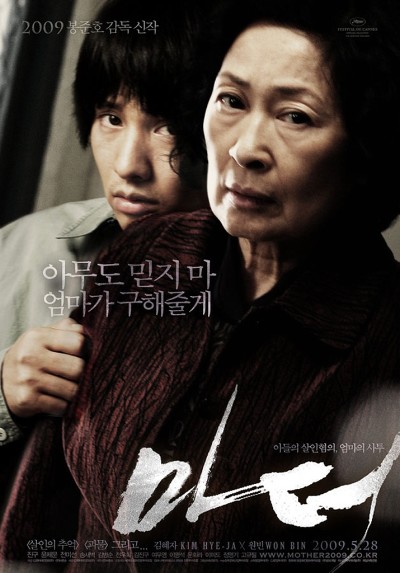★★★½
“Lies, damned lies and motherhood.”
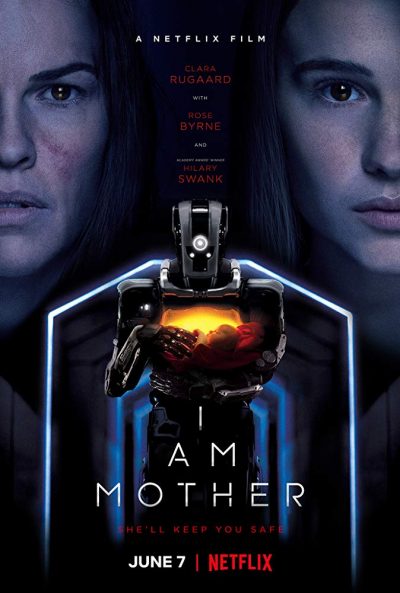 After an extinction-event has turned Earth uninhabitable, an underground “ark” holds thousands of human embryos, overseen by a robotic Mother (voiced by Byrne, performed by Hawker). One embryo is brought to fruition, becoming Daughter (Rugaard, resembling a young Jennifer Garner), who grows up into a young woman, educated by Mother to believe she’s alone on the planet. But she begins to doubt what Mother tells her, and these doubts are confirmed when another, older woman (Swank) shows up. Let in by Daughter, she tells tales of humanity outside struggling for survival against robot killers. Everything Daughter has been told is a lie. Or is the new arrival telling the whole truth either?
After an extinction-event has turned Earth uninhabitable, an underground “ark” holds thousands of human embryos, overseen by a robotic Mother (voiced by Byrne, performed by Hawker). One embryo is brought to fruition, becoming Daughter (Rugaard, resembling a young Jennifer Garner), who grows up into a young woman, educated by Mother to believe she’s alone on the planet. But she begins to doubt what Mother tells her, and these doubts are confirmed when another, older woman (Swank) shows up. Let in by Daughter, she tells tales of humanity outside struggling for survival against robot killers. Everything Daughter has been told is a lie. Or is the new arrival telling the whole truth either?
The film’s main strength is the way it manages expertly the shifting sands of audience perception. Initially, we’re led to believe that Mother is potentially the saviour of humanity. However, it soon becomes clear that the robot is not being entirely honest with her charge, and our sympathies move towards the Woman, who wants to rescue Daughter from her enforced isolation. Yet, in the end, there’s another agenda there as well, and right until the credits roll, you’re kept watching to see beyond the next bend in the story-line. While there are clues dropped, almost from the beginning, you may not notice them until everything comes together. Or perhaps even past that point; I’ll confess, I did have to do some light post-viewing Googling in order to grasp all the consequences.
It’s rare, especially in the SF genre, to see a film without a male speaking part [bar some archive footage from The Tonight Show, anyway!]. Though one senses any money saved on the small cast was simply diverted to an impressive set of production values, depicting not just the facility, but also the devastated outside world after… well, whatever the extinction event was, since it’s never described. That’s not really the focus of the film, yet I felt it was a bit of a shame, The story of the Woman’s survival, up until she came banging on the door, would have been equally interesting as the Daughter’s. I do have… let’s just say, some questions about the coincidence of them arriving at the air-lock at the same time, and also the Woman’s plot-convenient amnesia.
At 113 minutes, it does run somewhat long, and is a little light on action for my tastes. The film is definitely on the more cerebral side of science fiction cinema, something not apparent from the trailer. Rather than explosions, the script prefers to pose awkward questions about the needs of the many outweighing the needs of the few, or the moral implications of ripping it all up to start again. However, it never sinks to boring, with decent performances which help guide the film through the occasional doldrums. Hat-tip to Rob for steering me in the direction of a film which I’d otherwise likely have skipped past, in the never-ending and ongoing stream of Netflix original movies.
Dir: Grant Sputore
Star: Clara Rugaard, Rose Byrne, Hilary Swank, Luke Hawker





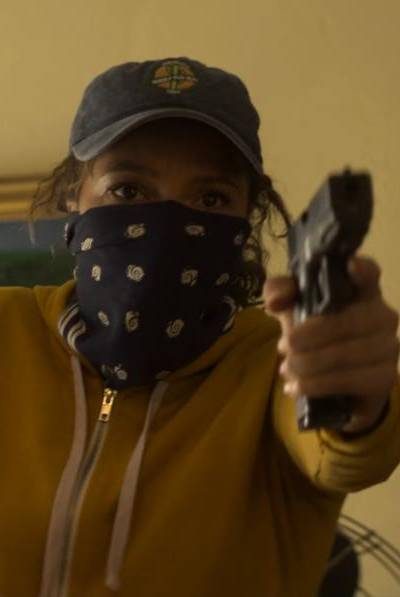 This occupies a rather odd middle-ground between a meditation on what it means to take a life, and a violent thriller. I’m not sure it manages to pull either off entirely successfully, yet some striking imagery helped sustain our interest. Katrina (Ejogo) is driving from Phoenix to Oklahoma City, with her young daughter, Clara (Pratt), to start a new life: it’s hinted that there may be an abusive partner in the rear-view mirror. The route takes her across the Texas Panhandle, and in an effort to avoid a traffic jam, she hits the back roads. This turns out to be mistake, as she first gets a flat, then Clara is bitten by a rattlesnake.
This occupies a rather odd middle-ground between a meditation on what it means to take a life, and a violent thriller. I’m not sure it manages to pull either off entirely successfully, yet some striking imagery helped sustain our interest. Katrina (Ejogo) is driving from Phoenix to Oklahoma City, with her young daughter, Clara (Pratt), to start a new life: it’s hinted that there may be an abusive partner in the rear-view mirror. The route takes her across the Texas Panhandle, and in an effort to avoid a traffic jam, she hits the back roads. This turns out to be mistake, as she first gets a flat, then Clara is bitten by a rattlesnake.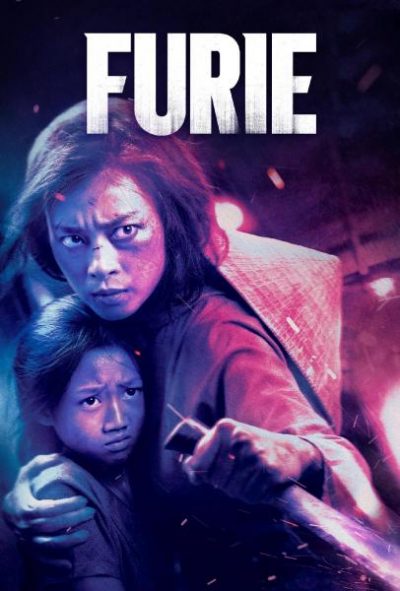 We’ve seen Ngo, the star here, previously on this site in
We’ve seen Ngo, the star here, previously on this site in 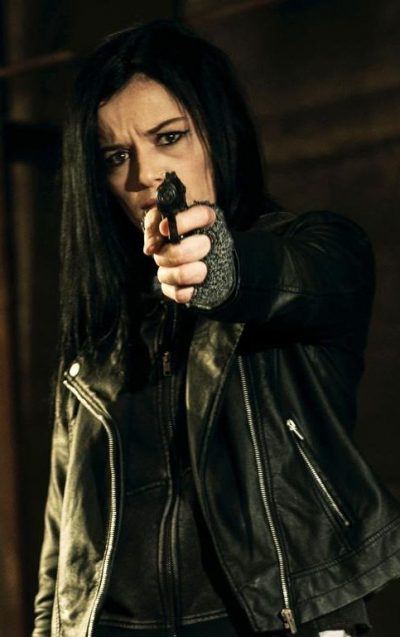 This wasn’t quite what we expected. In fact, replace “quite” with “at all”. It starts off as looking like some kind of revenge porn, with pathologist Margaret Powers (Tyson) kidnapping Finnbar (Ward), the man she’s certain murdered her son. Finnbar was apparently able to get away with it, because he was the son of a notorious local criminal, Tommy O’Neil (Hayman). She wants Finnbar to confess to his crime, and recruits her son’s ex-girlfriend, Zoe (Jarvis) to help in getting her vengeance. Initially, the capture goes well, with the two women then holing up in an abandoned warehouse by the docks, to begin the interrogation. However, this is where the film starts to diverge from the expected, as it turns out Zoe’s intentions are not in line with Margaret’s, as they initially appeared.
This wasn’t quite what we expected. In fact, replace “quite” with “at all”. It starts off as looking like some kind of revenge porn, with pathologist Margaret Powers (Tyson) kidnapping Finnbar (Ward), the man she’s certain murdered her son. Finnbar was apparently able to get away with it, because he was the son of a notorious local criminal, Tommy O’Neil (Hayman). She wants Finnbar to confess to his crime, and recruits her son’s ex-girlfriend, Zoe (Jarvis) to help in getting her vengeance. Initially, the capture goes well, with the two women then holing up in an abandoned warehouse by the docks, to begin the interrogation. However, this is where the film starts to diverge from the expected, as it turns out Zoe’s intentions are not in line with Margaret’s, as they initially appeared.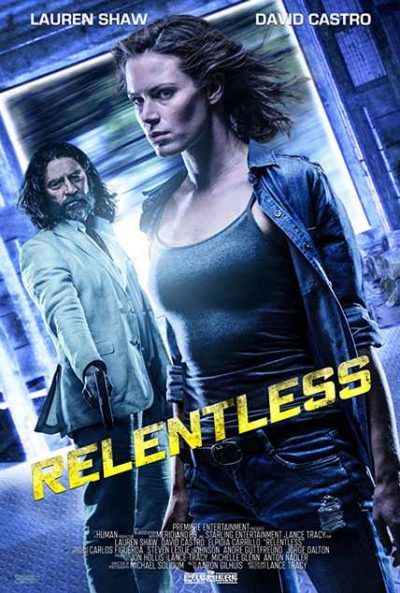 From just about all I’ve read, the director seems entirely earnest in his desire to make a serious film about a serious problem, human trafficking in Central America. That the end result falls almost entirely wide of the mark is a bit of a double-edged sword. In terms of making its intended point, that it feels more like a B-movie from the fifties is a bad thing. But on the other hand, the serious film about the serious problem would likely be considerably less amusing.
From just about all I’ve read, the director seems entirely earnest in his desire to make a serious film about a serious problem, human trafficking in Central America. That the end result falls almost entirely wide of the mark is a bit of a double-edged sword. In terms of making its intended point, that it feels more like a B-movie from the fifties is a bad thing. But on the other hand, the serious film about the serious problem would likely be considerably less amusing. Malorie Hayes (Bullock) is nervously heading towards the birth of a child, supported by her sister (Hayes), when a mysterious epidemic of suicidal psychosis breaks out worldwide. In the ensuing carnage, Malorie finds shelter in the home belonging to the acidic Douglas (Malkovich), whose wife dies trying to help Malorie, and a small number of other survivors. They figure out the epidemic is triggered by entities of some kind who are now prowling the planet – if you see them, you are overwhelmed by your worst fears and kill yourself. The obvious defense is not to make eye contact. Yet how do you survive in a world you cannot see? Especially when it turns out that those who were previously psychopathically inclined are immune to the effects, and are free to roam that world, with their sight intact.
Malorie Hayes (Bullock) is nervously heading towards the birth of a child, supported by her sister (Hayes), when a mysterious epidemic of suicidal psychosis breaks out worldwide. In the ensuing carnage, Malorie finds shelter in the home belonging to the acidic Douglas (Malkovich), whose wife dies trying to help Malorie, and a small number of other survivors. They figure out the epidemic is triggered by entities of some kind who are now prowling the planet – if you see them, you are overwhelmed by your worst fears and kill yourself. The obvious defense is not to make eye contact. Yet how do you survive in a world you cannot see? Especially when it turns out that those who were previously psychopathically inclined are immune to the effects, and are free to roam that world, with their sight intact.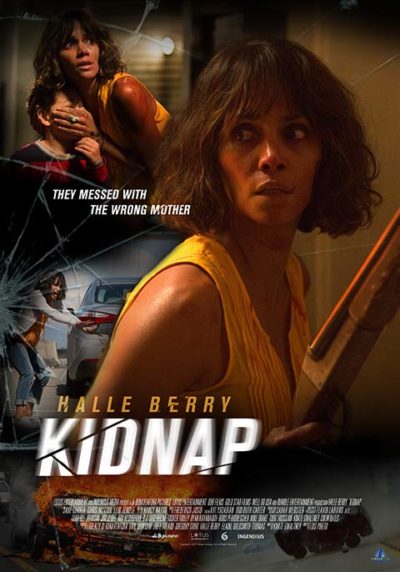 Oh, how the mighty have fallen. And considering Halle Berry’s last appearance on this site was for Catwoman, that’s saying something. This is so dumb, I genuinely felt I could feel my IQ slowly sliding away as I watched the movie. Even now, simply remembering it has me feeling more stupider by the sentence. If this review ends up sounding like Beavis & Butthead by the end, that will be why. Its plot is beyond simplistic. Karla Dixon (Berry) has her child abducted from a New Orleans park while she’s on the phone, by husband and wife kidnappers Margo (McGinn) and Terry (Temple). Losing her cell in the process, she takes off after them in hot pursuit, and nothing will get in her way for the next 80-odd minutes.
Oh, how the mighty have fallen. And considering Halle Berry’s last appearance on this site was for Catwoman, that’s saying something. This is so dumb, I genuinely felt I could feel my IQ slowly sliding away as I watched the movie. Even now, simply remembering it has me feeling more stupider by the sentence. If this review ends up sounding like Beavis & Butthead by the end, that will be why. Its plot is beyond simplistic. Karla Dixon (Berry) has her child abducted from a New Orleans park while she’s on the phone, by husband and wife kidnappers Margo (McGinn) and Terry (Temple). Losing her cell in the process, she takes off after them in hot pursuit, and nothing will get in her way for the next 80-odd minutes.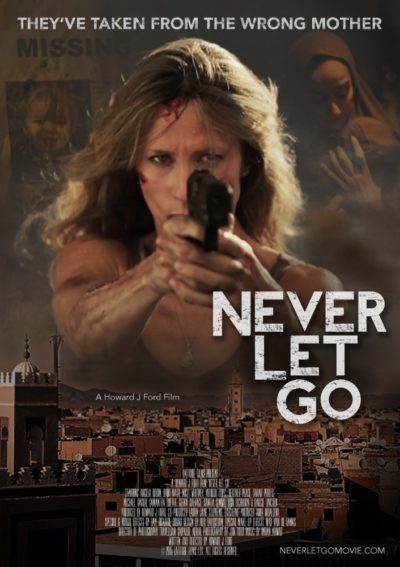 Based on the title and synopsis, I was expecting something like a Lifetime TV Movie. A mother frantically searching for her abducted child in a foreign location, before they can be sold off to some rich Arab, would seem right up their alley. [Though of course, this kind of thing has long been a popular subject for exploitation, to the point where the Hays Code of the thirties had explicitly to ban movies about “white slavery”] It’s a good deal grittier and harder hitting than that, though could have done with much better explanation of why this momma bear is so ferocious – among a number of other aspects.
Based on the title and synopsis, I was expecting something like a Lifetime TV Movie. A mother frantically searching for her abducted child in a foreign location, before they can be sold off to some rich Arab, would seem right up their alley. [Though of course, this kind of thing has long been a popular subject for exploitation, to the point where the Hays Code of the thirties had explicitly to ban movies about “white slavery”] It’s a good deal grittier and harder hitting than that, though could have done with much better explanation of why this momma bear is so ferocious – among a number of other aspects.